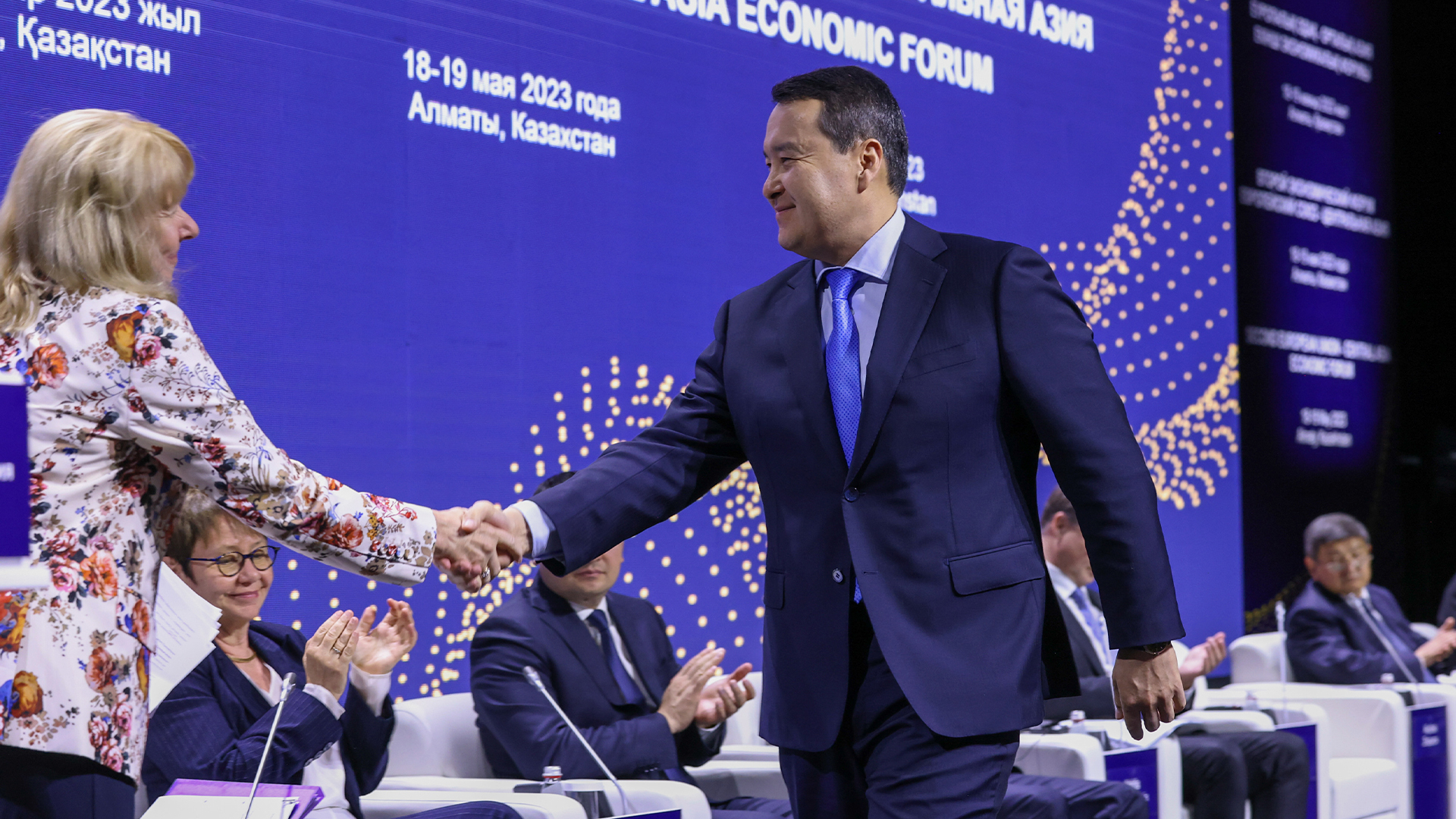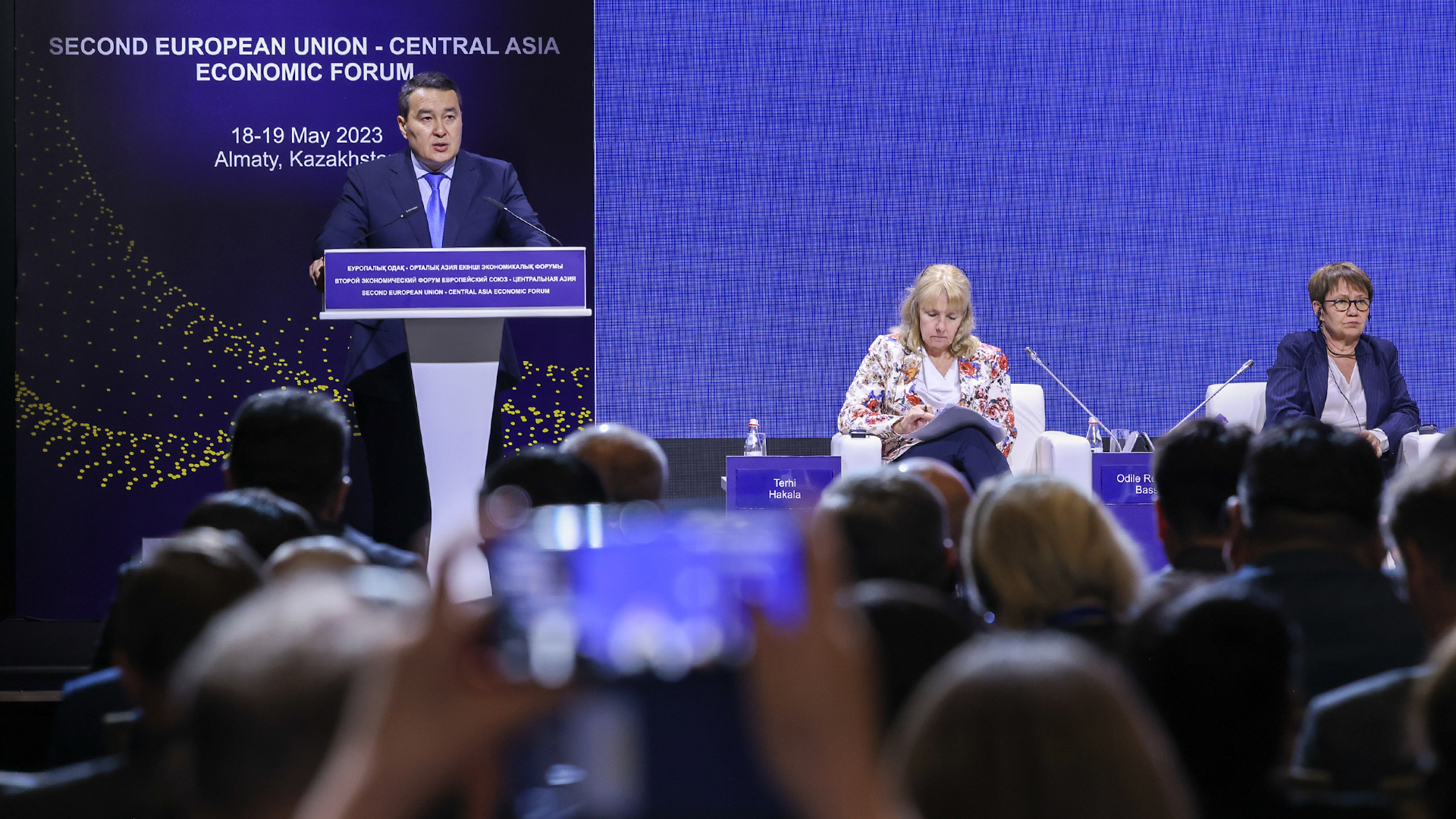ALMATY — The partnership between Astana and Brussels is built on years of pragmatic and progressive cooperation, said Prime Minister Alikhan Smailov during the high-level session of the second European Union-Central Asia Economic Forum in Almaty on May 19, Prime Minister’s press service reported.

Kazakhstan is prepared to actively participate in the execution of the EU’s digital initiatives in Central Asia, said Smailov on May 19. Photo credit: Prime Minister’s press service.
Smailov said the previous year was a “breakthrough” in Central Asian-EU cooperation. The trade turnover between Central Asian countries and the EU increased by 61%, reaching nearly $49 billion by the end of 2022. Of that amount, Kazakhstan-EU trade accounts for $39.9 billion.
A major agreement was recently signed with Svevind to build wind and solar power facilities in Kazakhstan, producing 3 million tons of green hydrogen, accounting for one-fifth of the EU’s need for this energy source.
The Prime Minister also mentioned a memorandum on rare earth metals that was signed at the United Nations Climate Change Conference (COP27) in November last year, which will help establish financial and technological cooperation between Kazakhstan and the EU’s industrial alliances.

Kazakh PM said that the transit time through Kazakh territory is expected to be reduced to 5 days by the year’s end. Photo credit: Prime Minister’s press service.
Smailov said Kazakhstan is ready to provide the EU with more than 175 processed commodities worth more than $2.3 billion annually in engineering, iron and steel production, food processing, and agriculture. As a significant grain producer, the country has the potential to become a strategic partner for the EU in implementing the global food agenda.
Kazakhstan’s well-developed transportation infrastructure offers plenty of transport and logistics cooperation opportunities, said Smailov. He noted that the country is already working in this direction by creating a wholesale distribution network of logistics facilities, such as an international center for industrial collaboration with Uzbekistan and an industrial trade and logistics complex with the Kyrgyz Republic.
“We are building two large trade and logistics hubs in the Almaty agglomeration and the West Kazakhstan region. They will link trade and logistics routes between China, Central Asia, Europe, and the Middle East,” Smailov said.
The Prime Minister also mentioned the rapid development of the Trans-Caspian International Transport Route, also known as the Middle Corridor. Thanks to joint efforts, the delivery time from China to Europe has been reduced by nearly three-fold from 53 to 19-23 days. The next goal is to reduce it to 14-18 days by the end of the year.
“Meanwhile, the transit time through Kazakhstan has been halved from 12 to 6 days, and we are striving to reduce it to 5 days by year’s end,” he said.
He concluded by outlining the opportunities for expanding Kazakh-EU cooperation in digitization, which is an essential driver of economic development.
Kazakhstan has established a strategic goal to become one of the region’s largest digital hubs. Appropriate banking ecosystems are already dynamically developing in the country, digital commerce is rapidly expanding, and work continues to digitally transform public administration.
“In March, Microsoft announced the establishment of a Multi-Regional Hub in Kazakhstan, which will serve as a magnet for advanced technologies and know-how. The hub will serve not just Central Asia but also Azerbaijan, Armenia, Georgia, Mongolia, and Pakistan,” he said.
In this regard, Kazakhstan is ready to take part in the EU’s digital initiatives in Central Asia.
The session was attended by Valdis Dombrovskis, Executive Vice-President of the European Commission, Akylbek Japarov, Chairman of the Cabinet of Ministers – Head of the Presidential Administration of the Kyrgyz Republic, Kokhir Rasulzoda, Prime Minister of Tajikistan, Jamshid Khodjaev, Deputy Prime Minister of Uzbekistan, Serdar Joraev, Minister of Finance and Economy of Turkmenistan, Odile Renaud-Basso, President of the European Bank for Reconstruction and Development, Teresa Czerwinska, Vice-President of the European Investment Bank and other officials and business representatives from Kazakhstan, Central Asia, and Europe.

